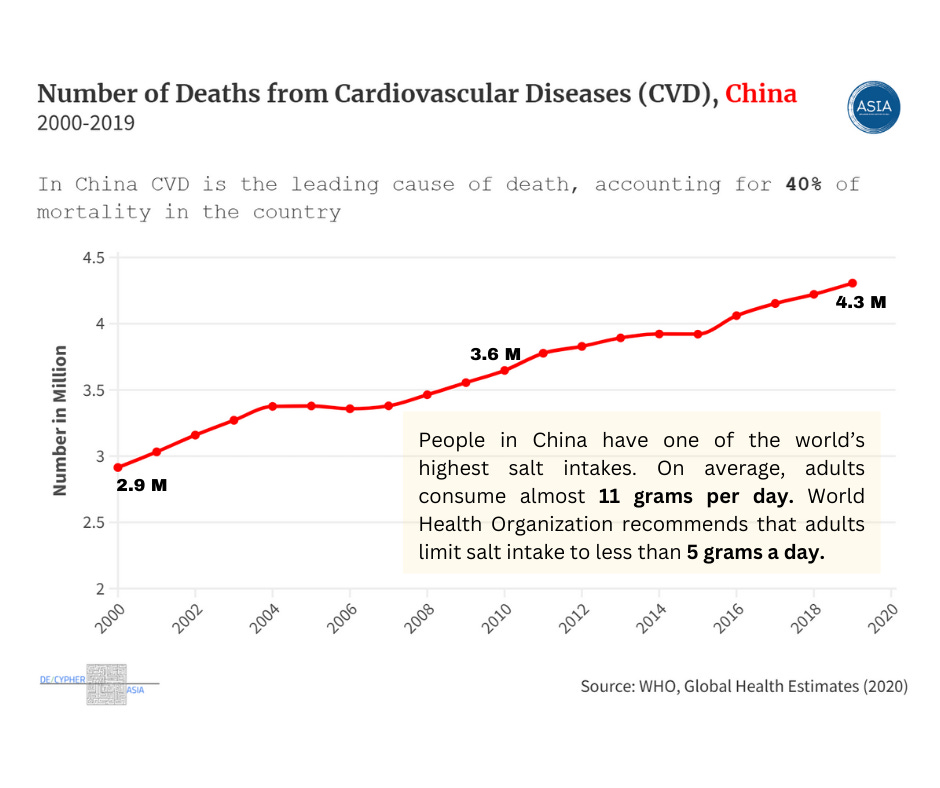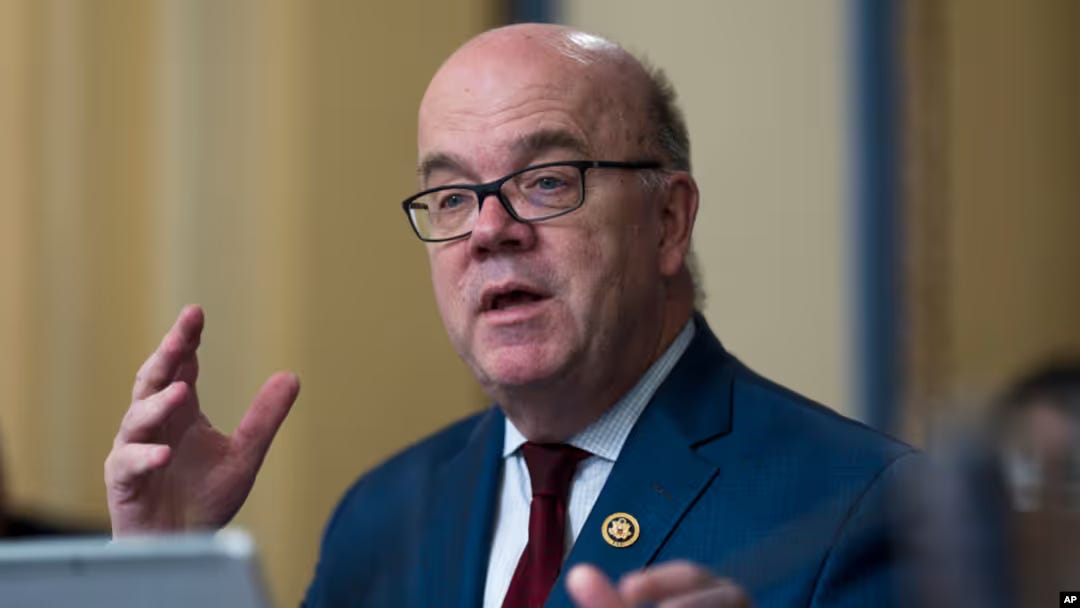Economic Woes Deepen: Typhoon Gaemi Claims 30 Lives in Hunan, US Moves to Contain China, Factory Output Declines
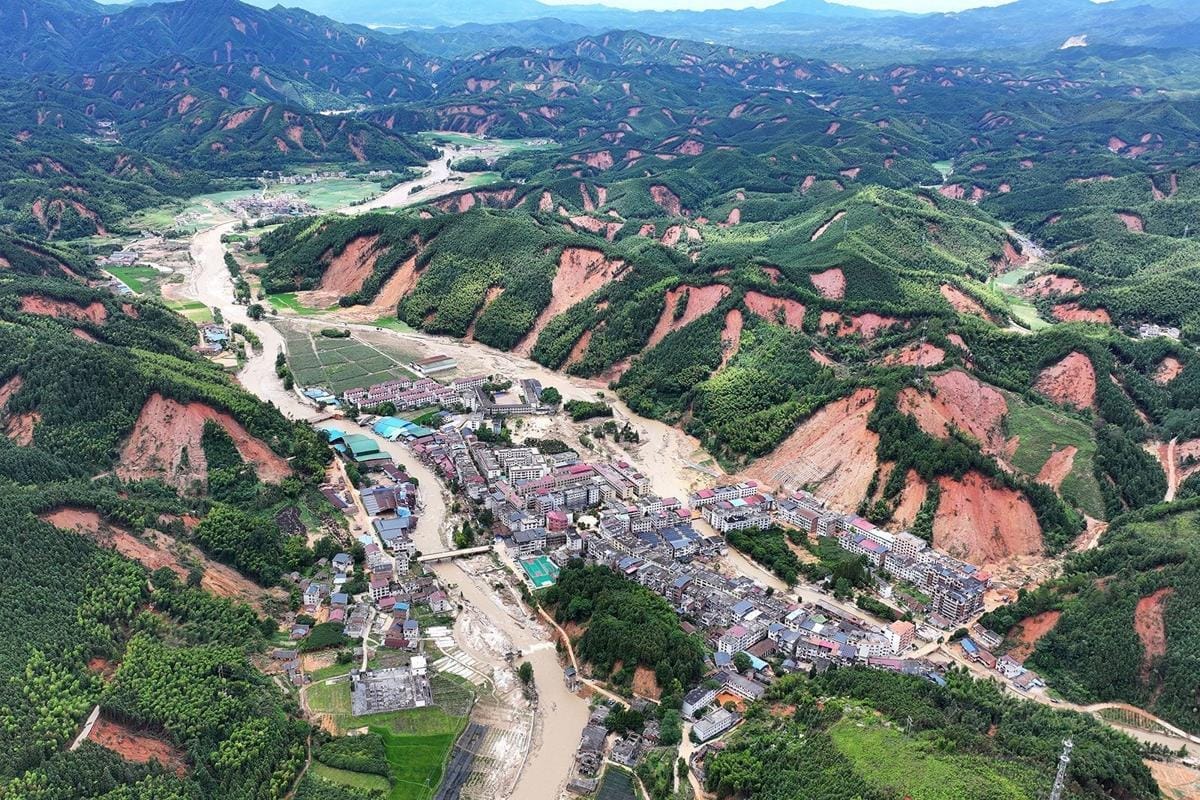
In Memoriam: James C. Scott (Dec 2, 1936- Jul 19, 2024)
James C. Scott was an influential American political scientist and anthropologist, known for his critical analysis of state power and the resistance of marginalised groups. A professor at Yale University and co-director of the Agrarian Studies Program, Scott authored seminal works such as "Weapons of the Weak: Everyday Forms of Peasant Resistance" (1985), "Seeing Like a State: How Certain Schemes to Improve the Human Condition Have Failed" (1998), and "The Art of Not Being Governed: An Anarchist History of Upland Southeast Asia" (2009). His interdisciplinary approach and focus on the agency of ordinary people left a lasting legacy in his fields.
De/Cypher Data Dive📈
Over 300 million people in China suffer from cardiovascular diseases (CVD). CVD is the leading cause of death, accounting for 40% of deaths in the country.
De/Cypher Signal🚥
Iran’s Threat to Israel
Written by Priyanka Garodia, Geopolitical Research Analyst - South Asia
The recent killing of Haniyeh, the political chief of Hamas, has led to condemnation of Israeli action by many governments. In response to the killing, Iran has been asked to launch a direct strike on Israel by Ayatollah Khomeini, adding fuel to an already volatile situation. The official Chinese Foreign Ministry spokesperson Lin Jian condemned the killing and asked for an immediate ceasefire. China has been stressing the need for a peaceful negotiation of the despite and has focused on initiating dialogue between the warring parties. The killing took place when Haniyeh was in Iran, leading to military action as drone strikes or a missile assault being discussed as a counteroffensive. Israeli aggression against the Hezbollah in Lebanon, the internal siege against Palestine and now worsened situations with Iran are adding to tensions. This could have repercussions for the Beijing Declaration signed by the Hamas and Fatah last month that was rejected by Israel. The motivation for Hamas to maintain peace is necessarily low.
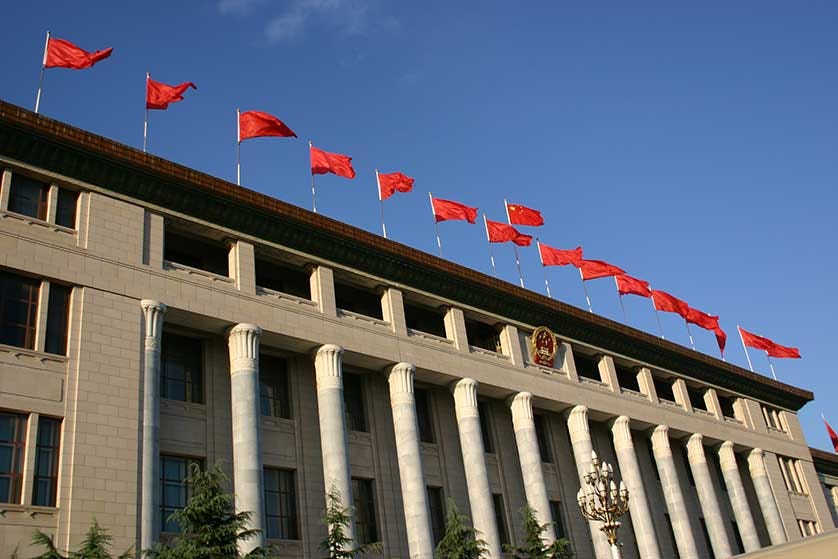
Quick China: Unmissable Stories 📜
China's Factory Activity Shrinks
China’s manufacturing activity unexpectedly shrank for the first time in nine months in July, a private survey showed, a sign the country’s export machine might be cooling, darkening the economy’s outlook.
The Caixin manufacturing purchasing managers index fell to 49.8 last month from 51.8 in June, according to a statement released by Caixin and S&P Global Thursday. It missed the median forecast of 51.5 and was the first time since October the gauge dropped under 50, which indicates contraction.
The private measure likely reflects weakening momentum in overseas shipments as it focuses on small and export-oriented firms. The bearish reading is another warning sign for a rare bright spot in the No. 2 economy after an official measure showed factory activity shrank for a third straight month in July.
“We have seen stronger performance in the Caixin reading, probably driven by better performance of smaller exporters. The decline of that today suggests there could be some risks of softer export momentum,” said Michelle Lam, Greater China economist at Societe Generale SA. (Bloomberg)
Italian PM Meloni wants to mediate between China & EU
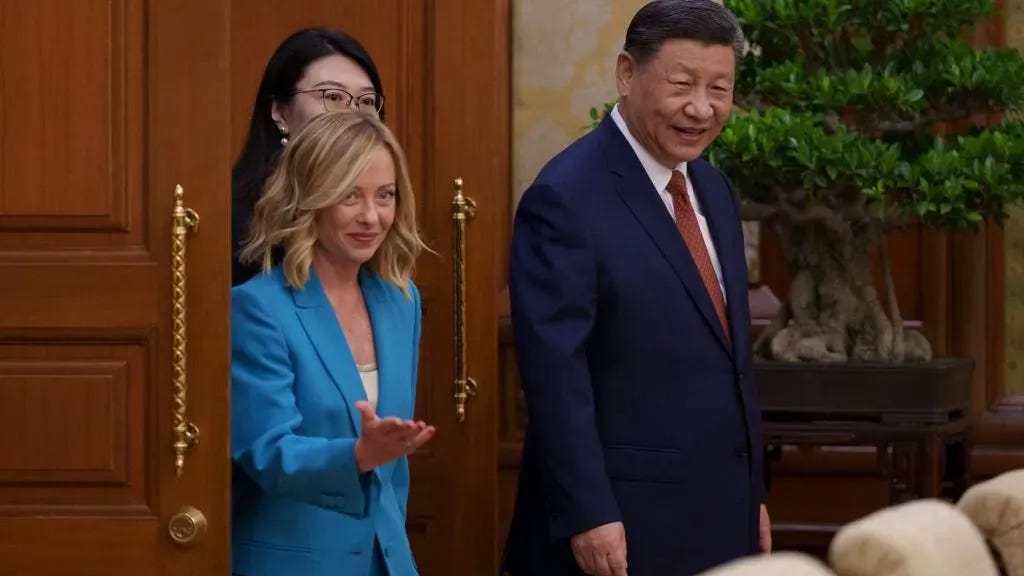
Italian Prime Minister Giorgia Meloni offered to broker better trade relations between China and the European Union, calling on President Xi Jinping to “balance out” commercial relations between the bloc and the world’s second-biggest economy.
“Italy can have an important role in EU relations and creating balanced relations,” Meloni said Monday in her first official visit to China since coming to power in 2022. “We need a rules-based order” as a way “to guarantee stability, peace, trade that remains free,” she said.
Getting the EU-China relationship back on track may prove a challenge for Meloni because she has limited sway over the bloc’s trade policy, which is run by the European Commission. (Caixin)
China goes back on shipbuilding spree with a US $ 690 Million investments
China’s state-owned shipbuilding giant, China Shipbuilding Industry Co. Ltd. (601989.SH), is to invest more than 5 billion yuan ($690 million) in two acquisition deals to expand its shipyard capacity and meet rising demand.
China Shipbuilding Industry, the Shanghai-listed arm of China State Shipbuilding Corp. Ltd. (CSSC), announced Saturday a 4.04 billion yuan acquisition of Tianjin Xingang Shipbuilding Heavy Industry Co. Ltd.’s assets in Lingang, northern China's port city Tianjin. (Caixin)
Politburo meets to discuss economic activity
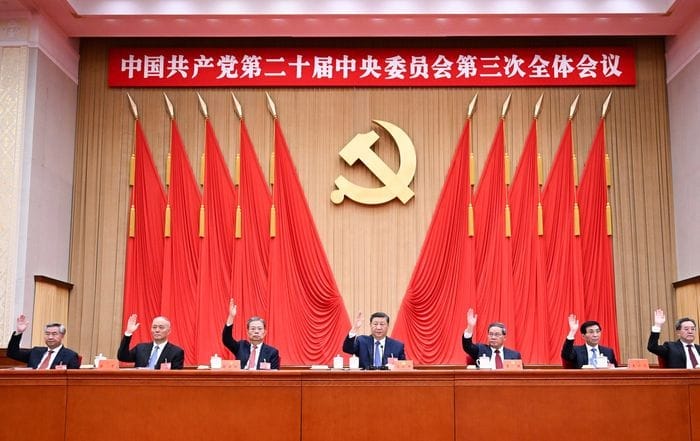
The Political Bureau of the CPC Central Committee Held a Meeting to Analyze and Study the Current Economic Situation and Economic Work, and Review the "Regulations on Rectifying Formalism to Reduce the Burden on Grassroots"
On July 30, the Political Bureau of the CPC Central Committee held a meeting to analyze and study the current economic situation, deploy economic work for the second half of the year, and review the "Regulations on Rectifying Formalism to Reduce the Burden on Grassroots." Xi Jinping, General Secretary of the CPC Central Committee, presided over the meeting.
中共中央政治局7月30日召开会议,分析研究当前经济形势,部署下半年经济工作,审议《整治形式主义为基层减负若干规定》。中共中央总书记习近平主持会议。
The meeting pointed out that since the beginning of this year, under the strong leadership of the CPC Central Committee with Comrade Xi Jinping at its core, all regions and departments have faced difficulties head-on, actively taken actions, deepened reform and opening up, strengthened macro-control, effectively responded to risks and challenges, and maintained overall economic stability with progress. The economy has continued to recover and improve, new drivers and advantages have been cultivated at an accelerated pace, high-quality development has been solidly advanced, and the overall social situation has remained stable.
会议认为,今年以来,在以习近平同志为核心的党中央坚强领导下,各地区各部门迎难而上、积极作为,深化改革开放,加强宏观调控,有效应对风险挑战,经济运行总体平稳、稳中有进,延续回升向好态势,新动能新优势加快培育,高质量发展扎实推进,社会大局保持稳定。
The meeting emphasized that the current external environment has brought more adverse impacts, domestic effective demand is insufficient, economic operations have shown differentiation, and there are still many risks and hidden dangers in key areas. The transition between old and new drivers of growth is experiencing pains. These are issues in development and transformation. We must enhance risk awareness and bottom-line thinking, actively and proactively respond, maintain strategic focus, strengthen development confidence, and promote the bright prospects of China's economy. (Sinocism)
Xi reviews military preparedness
In what may be Xi’s last appearance publicly until mid-August when the Beidaihe break ends, he chaired this Politburo’s 16th study session. The topic was “ modernizing the country's border, coastal and air defense to make it strong and solid” and the discussant was Huang Jizhong from the CMC's Joint Staff Department. Among the interesting bits from the official readout:
We should strengthen technological empowerment, enhance the construction of new means and conditions for border, maritime, and air defense, and construct a three-dimensional intelligent control system for border, maritime, and air defense. (Sinocism)
Sony's China Problem

Nintendo and Sony Group have struggled to find a Chinese audience for their Switch and PlayStation 5 consoles, with regulatory barriers keeping all but a fraction of their video games out of the roughly $42 billion market.
Tencent Holdings and other big Chinese game makers were among the highest-profile exhibitors at the ChinaJoy video game expo in Shanghai, one of the largest such events in Asia. The four-day show, which wrapped up Monday, drew around 370,000 people.
There was a Japanese presence at the expo as well. The local arm of Sony Interactive Entertainment (SIE) had a PlayStation booth, showcasing three in-development games made with local creators.
But some Chinese consumers take a skeptical view of Japanese games.
"Chinese games have interesting storylines that make you want to play them more and more," said a ChinaJoy attendee who was cosplaying as a character in an outfit inspired by ancient China. "Japanese games use a lot of IP [intellectual property], but I feel like they don't measure up to Chinese ones." (Nikkei)
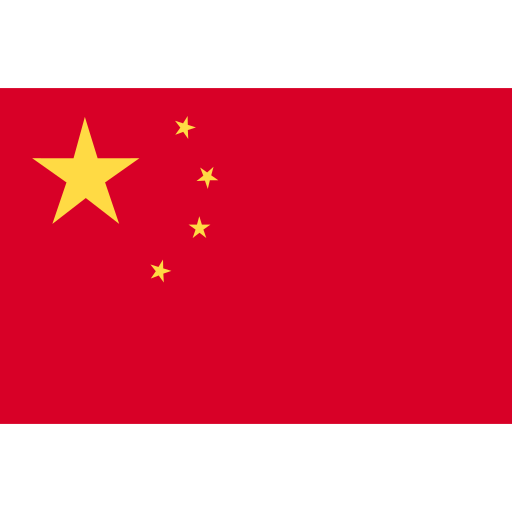
Beyond The Great Wall 🧱
Exploring News About China in Depth
Economy
China Vows to Focus on Consumption With Growth Target at Risk
Bloomberg reports that China’s ruling Communist Party has pledged to prioritize boosting consumer spending to counter weak domestic demand, which threatens the nation's growth target. This shift in focus comes amid an export boom but stagnant consumer sentiment, a property crisis, and a weak job market. Despite broad pledges to support the economy, market skepticism persists due to a lack of detailed policies.
China’s Malaise Spreads to Luxury Industry
Nick Kostov and Stacy Meichtry write in the WSJ that LVMH and other luxury brands are reporting slowing sales as Chinese consumers curb spending. LVMH’s Asia market sales dropped 14% in three months, reflecting weaker consumer confidence due to high youth unemployment and declining real estate prices. Luxury brands like Burberry and Swatch are also experiencing significant sales declines in China, sparking concerns about a long-term shift in consumer behavior.
Rich Hong Kong Families Sell Mansions at Discounts to Repay Debt
Krystal Chia, Venus Feng, and Lorretta Chen report in Bloomberg that Hong Kong's wealthy families are offloading luxury properties at significant discounts to repay debts amid a real estate slump. The Ho family sold seven properties for $250 million, some at half their peak value. About 75% of high-end property transactions this year involved financially stressed sellers, driven by declining property values and high interest rates. This trend is expected to continue as borrowing costs remain high.
China to Abolish Temporary Export Control of Certain Consumer Drones
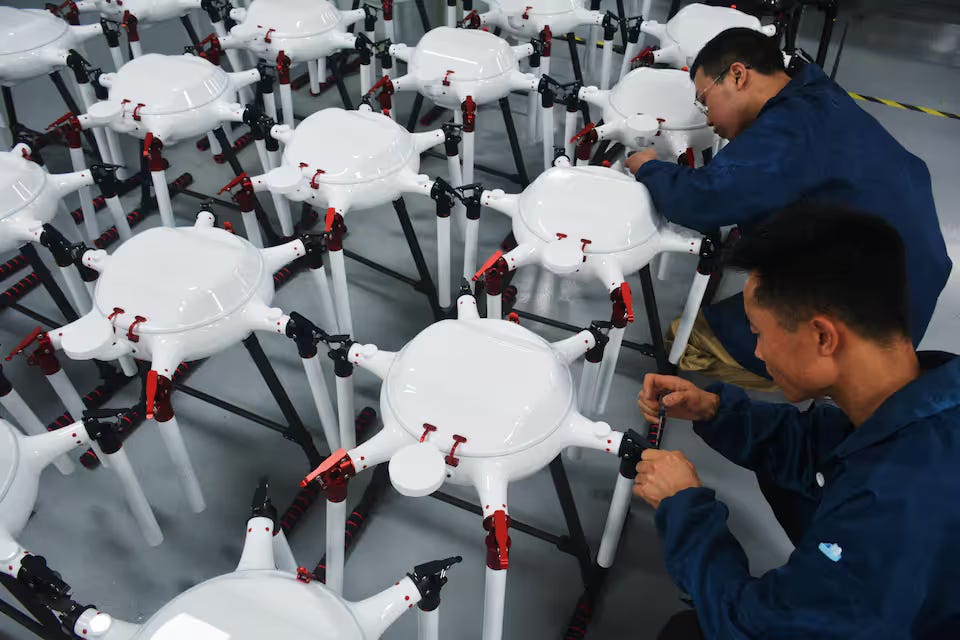
VOA reports that China will amend its drone export controls starting September 1, including abolishing temporary export controls for some consumer drones. This move aims to safeguard global industrial supply chains. The Ministry of Commerce will also adjust control standards for key unmanned aircraft components. Chinese drone maker DJI Technology Co welcomed the changes, asserting their products are for civilian use only and comply with export control laws.
Internal Politics 🏛️
Former State-Owned Oil Giant Chairman Booted From Communist Party
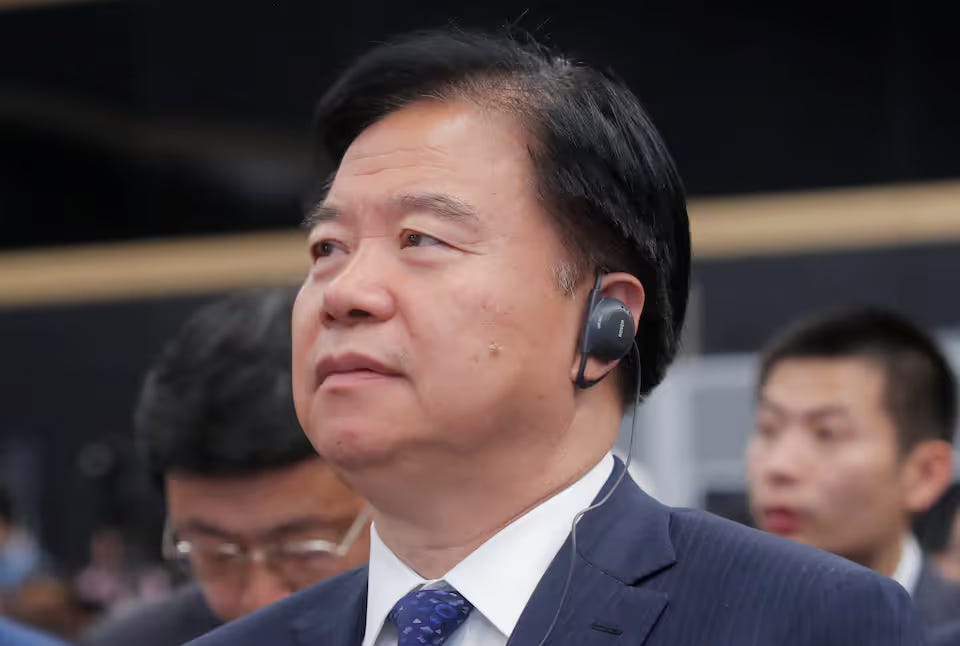
Wang Xintong and Luo Guoping write in Caixin that Wang Yilin, former chairman and Communist Party chief of China National Petroleum Corp. (CNPC), was expelled from the party for accepting significant bribes and associating with political fraudsters. The Central Commission for Discipline Inspection (CCDI) announced that Wang's case, involving undisclosed amounts of bribery, has been handed over to prosecutors.
Chinese Commentator Hu Xijin Silent on Social Media After Third Plenum Article Vanishes
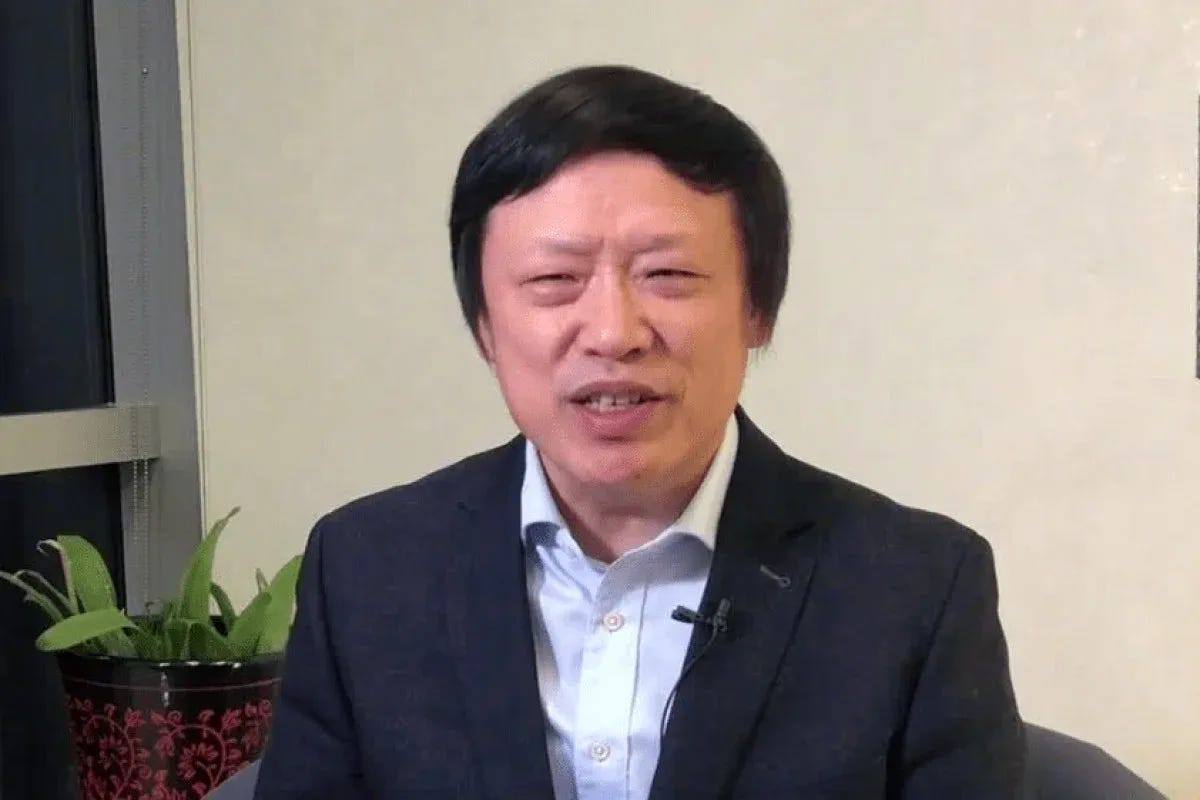
William Zheng writes in SCMP that Hu Xijin, former editor-in-chief of the Global Times, has gone silent on social media after his article interpreting a Communist Party economic strategy document was deleted. Hu's piece noted a significant omission in the third plenum resolution, which he called a "historic change," suggesting a shift towards equality between private and state-owned economies. His commentary faced backlash from conservative bloggers, leading to the article's removal and Hu's subsequent silence.
Have Secrets, Will Travel? Not So Fast, China Says
Chun Han Wong writes in the WSJ that China has issued new regulations to tighten the protection of state secrets amid rising espionage concerns. The rules mandate rigorous scrutiny of international travel for those with access to confidential information and increase the responsibility of internet companies to prevent leaks. These changes are part of Xi Jinping’s broader counterespionage campaign and come amid growing geopolitical tensions.
Birth Rate Woes Hit China Where Schools Are Closing for Lack of Children
Yijing Shen writes in SCMP that several Chinese provinces, including Jiangxi, Hubei, and Hunan, are reducing teacher recruitment due to a decline in school-aged children, reflecting China's demographic challenges. The reduction in teaching positions exacerbates an already bleak job market. Jiangxi’s education department noted a 54.7% cut in new teaching positions, linking it to the "ultra-low" fertility rate, with national preschool enrolments declining for the third consecutive year.
Remnants of Typhoon Gaemi Leave 30 Dead in China's Hunan
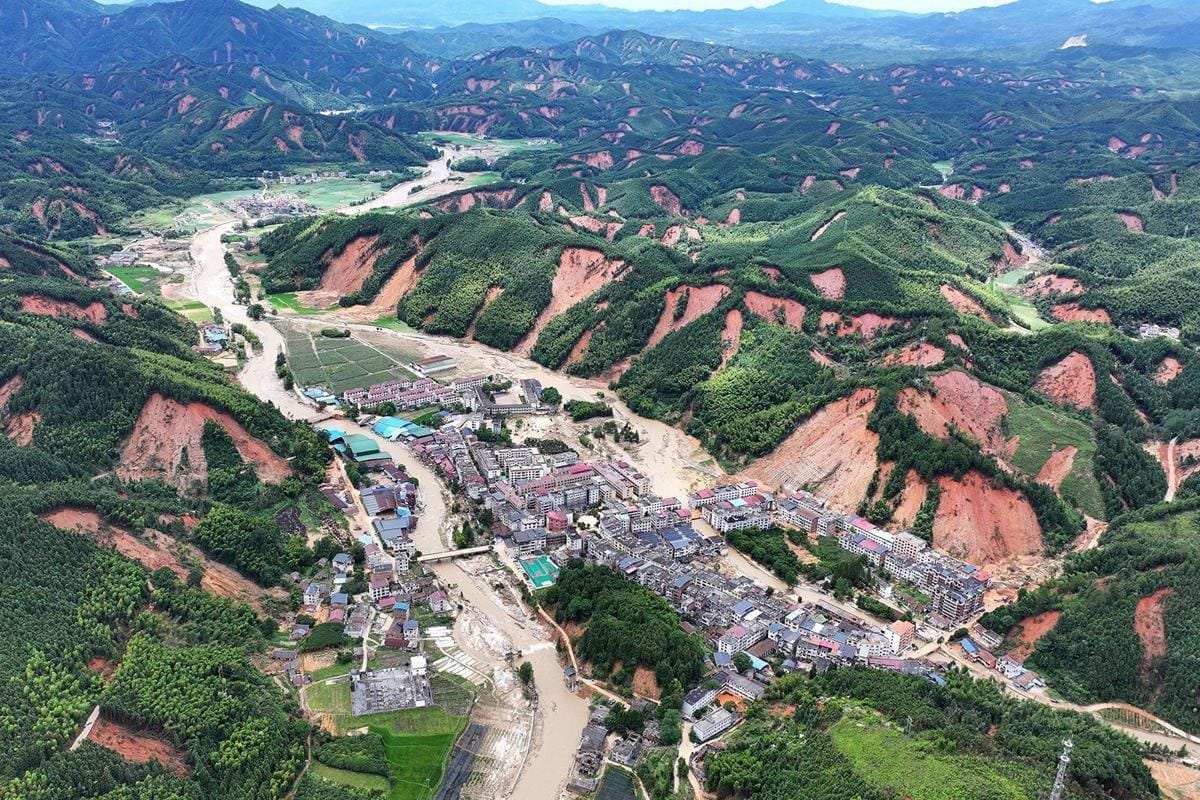
Reuters reports that 30 people were killed and 35 are still missing following the rains and storms caused by Typhoon Gaemi, which hit southern China last week. The city of Zixing in Hunan province was severely affected, with extreme weather impacting nearly 90,000 people, damaging about 1,400 homes, and tearing up about 1,300 roads. Record rainfall of over 645 mm (25.3 inches) was reported in some areas.
China And The World🌐
China Strongly Condemns Assassination of Hamas Political Leader
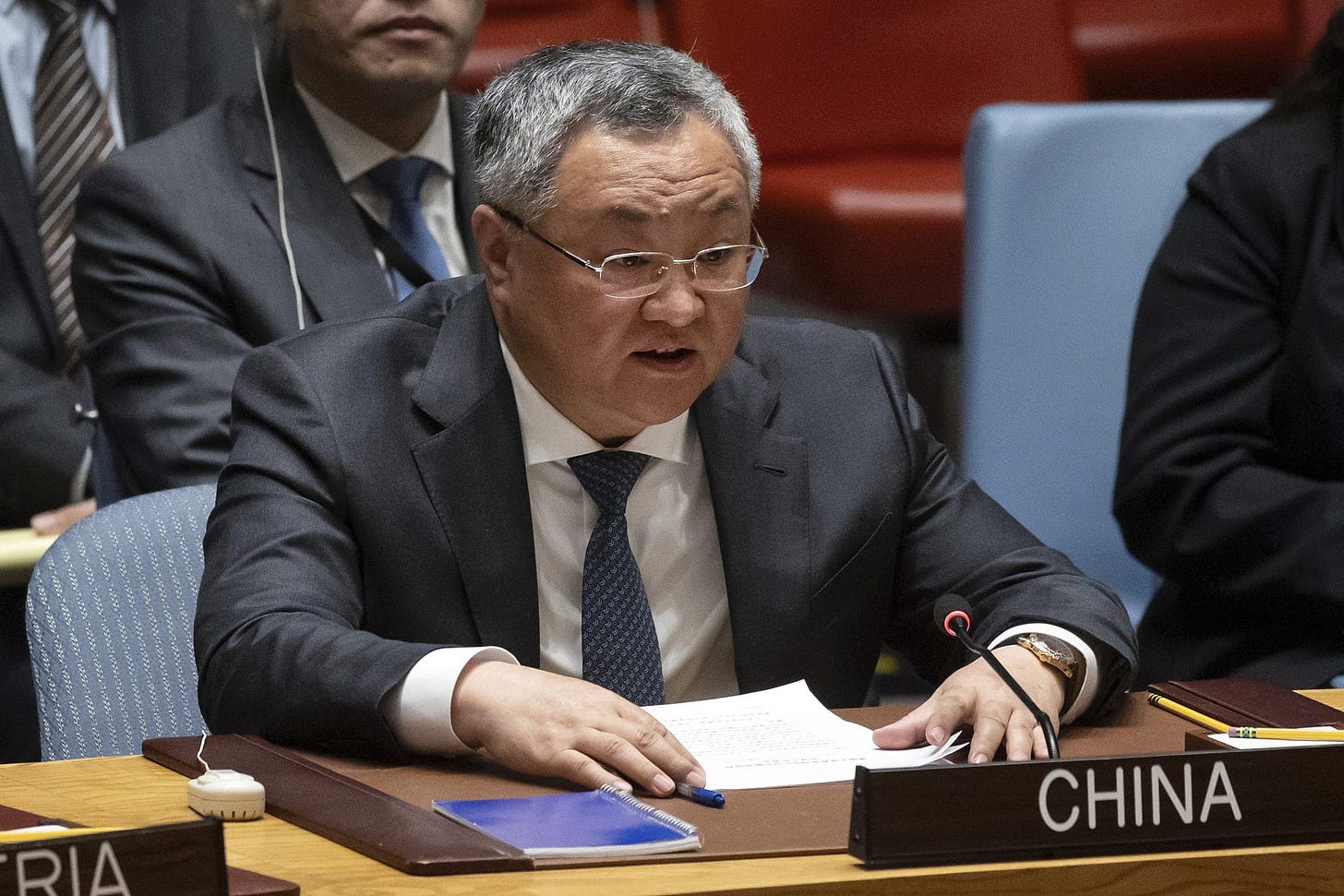
CGTN reports that Fu Cong, China's permanent representative to the United Nations, condemned the assassination of Hamas's political leader Ismail Haniyeh, who was killed in an airstrike in Tehran. Fu described the act as a sabotage of peace efforts and a violation of international sovereignty principles. During a UN Security Council meeting, Fu expressed concern over regional destabilization and called for an immediate ceasefire and adherence to international mediation efforts.
China, India to Speed Up Border Talks, Says Chinese Foreign Ministry
Reuters reports that China and India will expedite negotiations concerning their disputed Himalayan border to maintain peace and stability in the region. This decision was made during the 30th meeting of the China-India Border Affairs Consultation and Coordination Working Mechanism held in New Delhi.
Chinese Warship Joins Russian Navy for Gulf of Finland Exercises
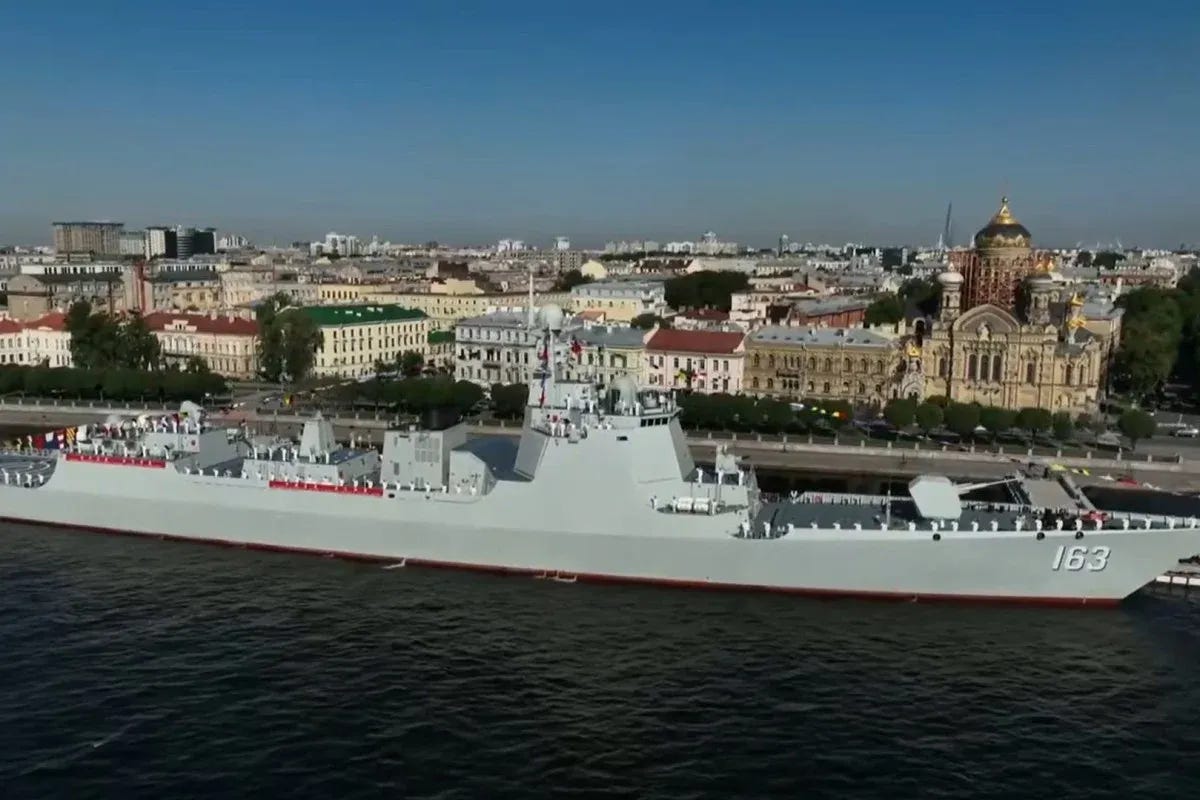
Sylvie Zhuang writes in SCMP that a Chinese warship, the guided-missile destroyer Jiaozuo, participated in naval exercises with Russia in the Gulf of Finland, following Russia’s navy day celebrations in St Petersburg. The Jiaozuo, along with the support ship Honghu, conducted simulated anti-mine and search and rescue operations with the Russian corvette Soobrazitelny. NATO closely monitors China’s military cooperation with Russia, expressing concerns over their deepening partnership and recent joint exercises near South Korea and China.
China Sanctions US Lawmaker
Katherine Michaelson writes in VOA that China has sanctioned U.S. Representative Jim McGovern for sponsoring a bill advocating a peaceful resolution to the China-Tibet dispute. The sanctions, announced by Chinese state-media agency Xinhua, freeze McGovern’s Chinese assets, ban Chinese entities from engaging with him, and prohibit his and his family's entry into China. The sanctions are in response to McGovern’s Tibet-China Dispute Act, which counters Chinese disinformation and promotes dialogue between Chinese leaders and the Dalai Lama. McGovern’s bill aims to address human rights abuses in Tibet.
China Denies Germany’s Cyberattack Allegations
TVC News reports that China's embassy in Berlin has rejected German claims that Beijing was responsible for a 2021 cyberattack on a German government agency, labelling the accusations as "anti-China political manipulation." Germany had summoned the Chinese ambassador to file a complaint, attributing the cyberattack to Chinese state actors based on intelligence services. The Chinese embassy urged Germany to cease political manipulation and public smears under the pretext of cybersecurity issues.
China Makes a Port Play in Peru
Mary Anastasia O’Grady writes in the WSJ that China's Cosco Shipping, owning 60% of the new Port of Chancay in Peru, is set to operate the facility, potentially opening it for Chinese naval use. Peru's deepening economic ties with China, including President Dina Boluarte's meetings with Chinese companies, raise U.S. national-security concerns. Critics argue U.S. policies and waning investment create opportunities for Chinese influence in the region, emphasizing the need for diversified investments and stronger U.S.-Peruvian commercial ties.
Grifols’ New Auditor Discovers Non-Cash Accounting Discrepancy Linked to China Stake

Irene Garcia Perez and Clara Hernanz Lizarraga report in Bloomberg that Spain’s Grifols SA will announce an accounting adjustment related to its stake in Shanghai RAAS, discovered by new auditor Deloitte. The company overstated an asset's value by €400 million. This adjustment, not impacting the profit and loss statement, follows scrutiny since January when Gotham City Research accused Grifols of financial manipulation. Grifols denied wrongdoing but made executive changes and is now undergoing due diligence by Brookfield, which is considering a takeover bid. Grifols will report second-quarter earnings after the market closes in Madrid.
TikTok Collected U.S. Users’ Views on Gun Control, Abortion and Religion, U.S. Says
Georgia Wells and Sadie Gurman write in the WSJ that the Justice Department claims TikTok tracked U.S. users' views on sensitive topics like gun control, abortion, and religion, following directives from its Chinese parent company, ByteDance. The department's findings, part of a court filing against a law mandating TikTok's sale or ban, argue that TikTok's data collection practices pose a national-security threat. TikTok defends its practices, asserting that a ban would violate First Amendment rights. The Justice Department, however, emphasises that ByteDance's influence over TikTok extends to content moderation and user data access.
Boeing’s First Engineer Came From China. Now It Hires Mostly From India
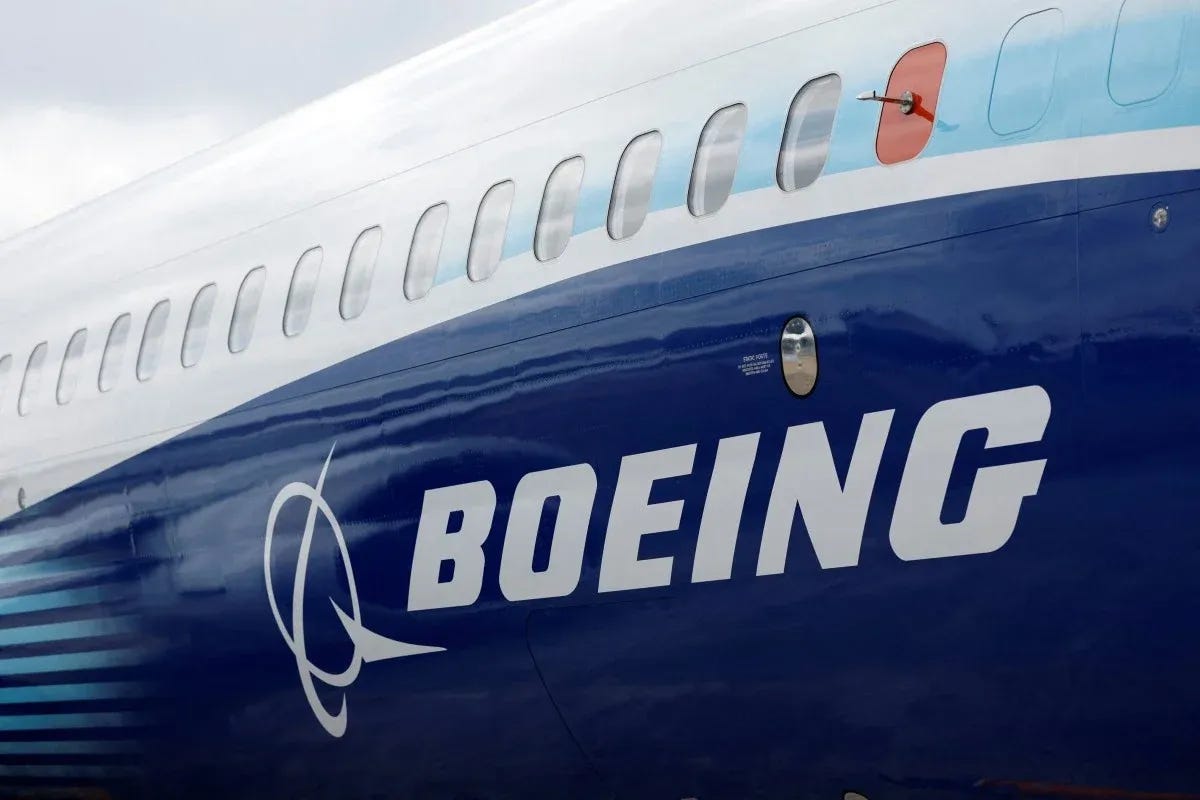
Victoria Bela writes in SCMP that Boeing is hiring significantly more engineers in India than in China amid geopolitical concerns. Currently, Boeing has five job openings in China compared to 83 in India. This trend reflects the US strategy to reduce dependence on Chinese talent. Historically, China has contributed to Boeing's success, with Beijing-born Wong Tsu playing a crucial role in the company's early aircraft designs. Despite China’s growing aviation market, Boeing’s focus is shifting towards India, which has become a major hub for American companies diversifying from China.
One of America’s Hottest Entertainment Apps Is Chinese-Owned
Raffaele Huang writes in WSJ that Talkie, an AI-powered chatbot app allowing users to converse with virtual celebrities or romantic partners, is gaining popularity in the U.S. despite its Chinese ownership through Shanghai-based MiniMax. Ranking fifth among free entertainment apps, Talkie generates revenue via ads and subscriptions. Its success highlights Chinese developers' move abroad amid strict domestic regulations. However, rising U.S.-China tensions and restrictions on AI model access pose risks to such ventures.
Are we really in a “new Cold War” with China?
Joshua Keating writes in Vox that US Ambassador to China Nicholas Burns discusses the complexity of the US-China relationship. Burns argues that while the competition with China is intense, it differs from the Cold War with the Soviet Union due to China's significant economic power. He highlights cooperation on issues like climate change, despite tensions over Taiwan, trade, and China's support for Russia. Burns emphasises the need for a balanced approach, advocating for self-sufficiency in critical materials while maintaining strong economic ties with China.
Tech🧑💻 in China
Xi Jinping Calls for High-Tech 'Smart System' in Border Defense Amid Rising Tensions
Benzinga reports that Chinese President Xi Jinping has urged the integration of advanced technology in border defense, advocating for a "smart system." During a Politburo study session, Xi emphasized the need for a "comprehensive and smart management and control system," aligning with his goal of military modernization by 2027 and achieving a world-class military by 2050. This push comes amidst rising tensions in the South and East China Seas and includes advancements in reconnaissance, surveillance, and AI-incorporated unmanned weapons.
China’s New Ultra-Fast Chip Could Double the Pace of Electronic Warfare: Research Team

Stephen Chen reports in SCMP that Chinese scientists at the University of Electronic Science and Technology of China (UESTC) have developed an ultra-fast analogue-to-digital converter (ADC) for military use. The device can reduce the time delay of electronic warfare receivers from nanoseconds to picoseconds, significantly enhancing radar signal detection and response times by 91.46%. This breakthrough technology, inspired by electroencephalogram (EEG) monitors, could provide the Chinese military with a critical edge in real combat, nearly doubling their combat speed. The chip is cost-effective, easy to mass-produce, and aims to save over 30% power under various conditions.
Is This Chinese AI Model a Seismic Change in Earthquake Prediction?
Yijing Shen writes in SCMP that China has launched its first large artificial intelligence model, "DiTing," to predict earthquakes. Developed using extensive data from the China Earthquake Observation Network, DiTing aims to improve the accuracy and speed of seismic signal recognition. The model, named after a divine beast in Chinese Buddhism, can analyze 100 million parameters and is expected to reach a billion by August. The technology supports various applications, including seismic monitoring and oil and gas exploration, marking a significant advancement in AI-driven seismology.
Chinese Containment in the Indo-Pacific by USA
Written by Priyanka Garodia, Geopolitical Research Analyst - South Asia
Japan and the United States have strengthened their military relationship to ensure preparedness keeping in view increasing Chinese aggression. The two countries have been engaging in ‘2+2 talks’ including high-level discussions and strategic partnerships meetings to ensure cooperation in military affairs. These meetings have resulted in the establishment of a new US military command in Japan, ensuring support for Japanese to build its military capacity. The US Secretary of State Antony Blinken, Defence Secretary Lloyd Austin, and their Japanese counterparts, Foreign Minister Kamikawa Yoko and Defence Minister Kihara Minoru, unveiled the new measures in during a visit to Japan.
The world presents multiple points of insecurity for the Unites States and its global predominance. The foremost of which is the threat that China poses whether in terms of economy, global influence and now increasing the military. The Chinese government's plan to strengthen its military might included raising its military budget significantly by 7.2% and becoming a major arms supplier. Increasing Chinese aggression in the South China Sea region and the number of nuclear warheads China possess adds to the problem. USA appears to be containing China’s domain of influence and appears to be preparing to strategically establish military connections which would allow it to respond immediately to a Chinese attack. It earlier signed a military agreement with the Philippines that allowed the Americans to interject on behalf of the Filipinos in case of a direct attack by China, it substantiated its military commitment to the Philippines with $500 million in aid for military development.
There is no doubt that the Americans see China as their largest security threat in the Indo-Pacific and it does not take its enemy lightly.
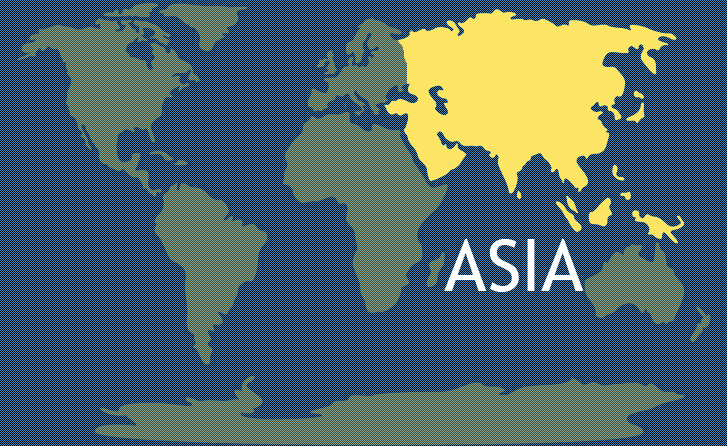
News From Asia
Friday
In India and China, torrential rains have killed more than 200 people in the past week. Three others died in Pakistan. (Arab News)
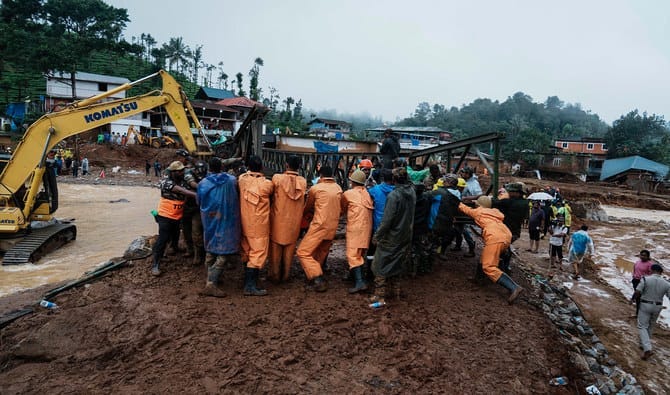
The military regime that seized power in Myanmar 3 1/2 years ago extended a state of emergency in the civil war-wracked country for another six months. (KTVZ)
South Korea offered aid to North Korea as the isolated regime grapples with the fallout from massive flooding in its northern regions. (Korea JoongAng Daily)
World shares tumbled Friday, with Japan’s Nikkei 225 index slumping 5.8% as investors panicked over signs of weakness in the U.S. economy. (AP)
Thursday
India on Thursday offered a $300 million loan to build up Vietnam’s maritime security, as the two sides said they want to double their trade and investment within five years. (AP)
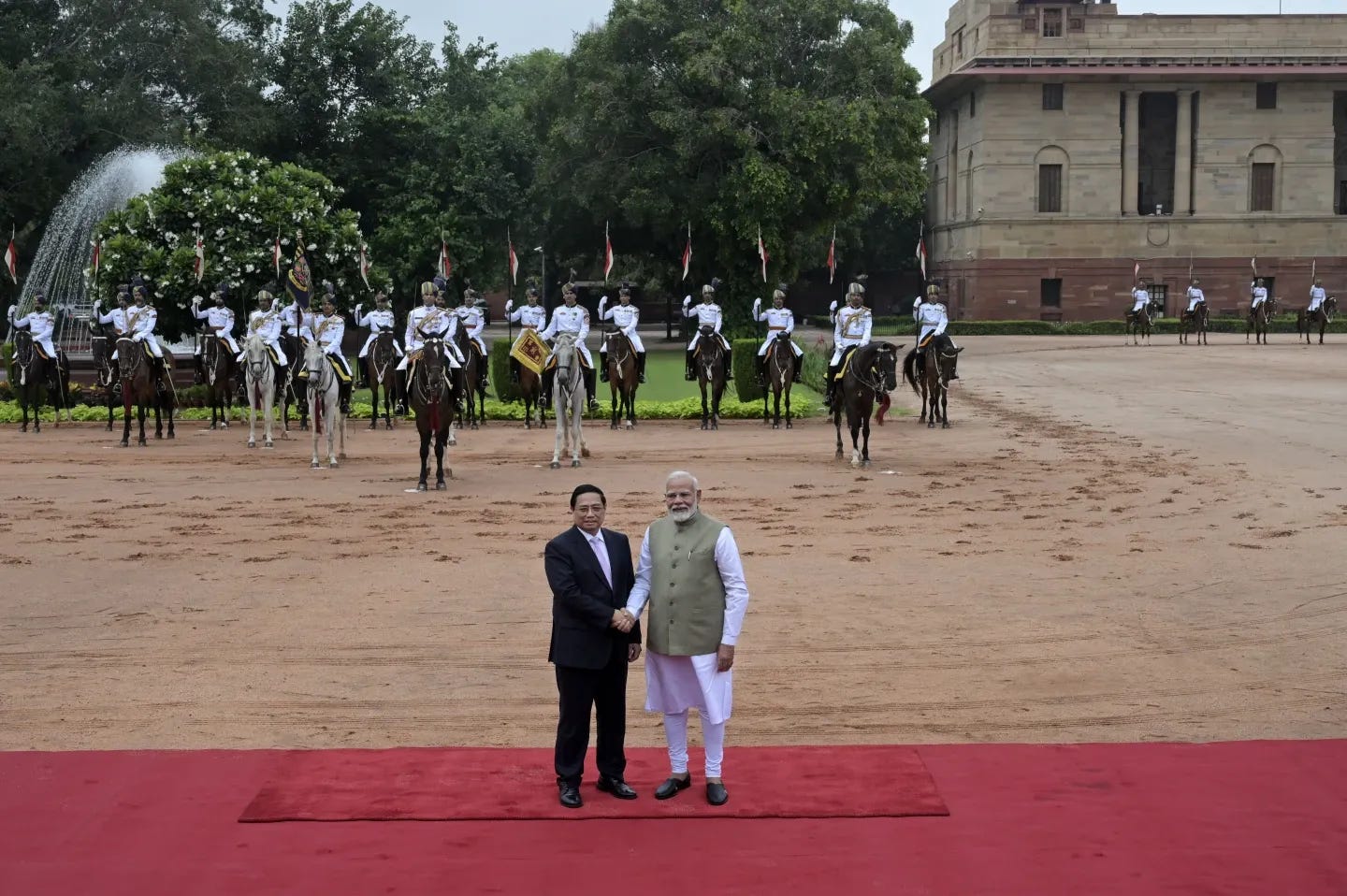
U.S. Secretary of State Antony Blinken sought this week to project an aura of calm normalcy as he travelled through Asia on his first overseas mission since President Joe Biden jolted the 2024 presidential race with his withdrawal. (ABC)
A Montenegrin appeals court has upheld a ruling by a lower court to hand over a South Korean mogul known as “the cryptocurrency king” to his native country. (KTVZ)
A panel at Japan's industry ministry has effectively approved a draft report on the first stage survey to choose a final disposal site for high-level radioactive waste from nuclear plants. (NHK)
Wednesday
Tensions are rising after Israeli airstrikes killed key Hamas and Hezbollah figures in Tehran and Beirut. (Bloomberg)
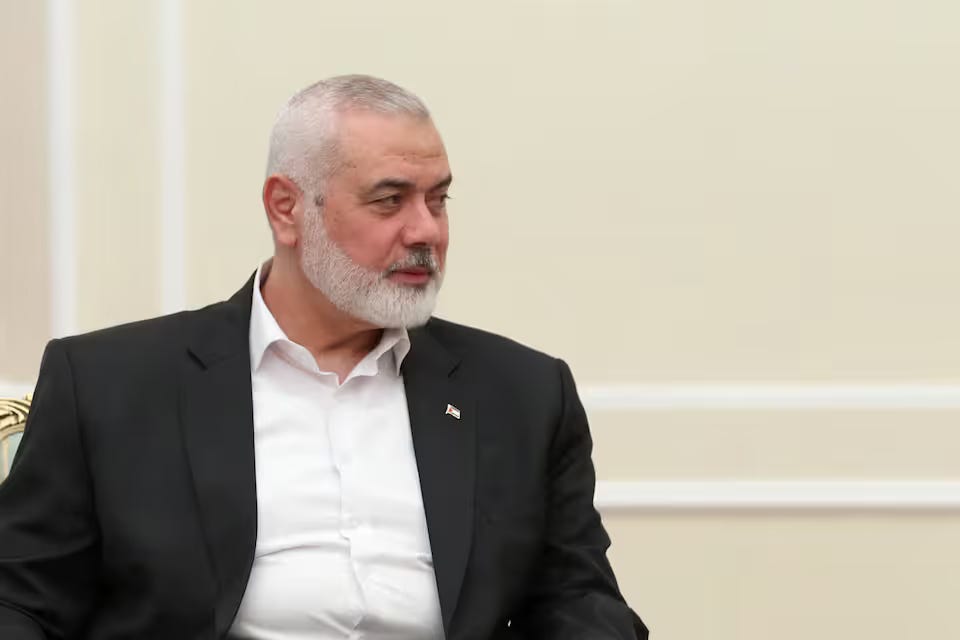
Indian billionaire Gautam Adani is considering a $2 billion investment in a port in Vietnam’s coastal city of Danang. (Bloomberg)
The Allahabad High Court emphasized the need for foreign nationals engaged in business in India to be accountable under Indian laws. (Bar and Bench)
Myanmar's junta on Wednesday (Jul 31) extended the state of emergency by six months, again delaying fresh polls it has promised to hold as it battles opposition to its coup. (CNA)
Tuesday
Masoud Pezeshkian officially became the new president of Iran after an oath-taking ceremony at the parliament in Tehran on Tuesday. (Daily Sabah)
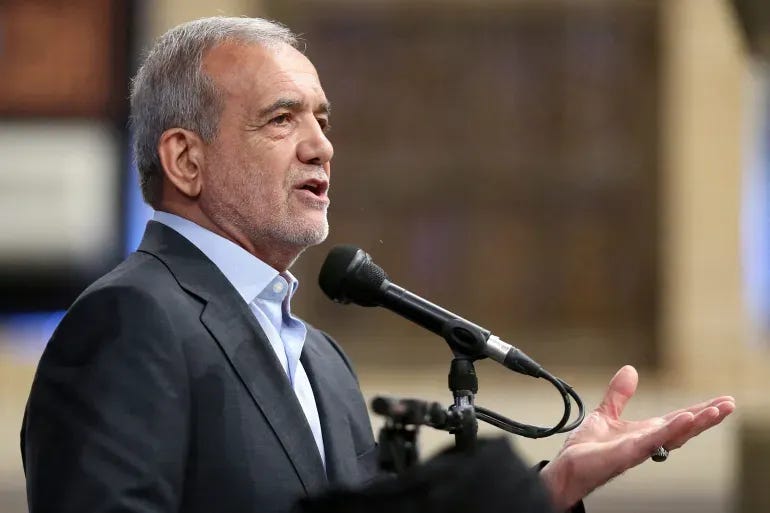
Cambodia’s Defense Ministry and state media reports say that the wreckage of a Cambodian military helicopter that went missing more than two weeks ago with two pilots aboard has been spotted on a mountaintop. (KTVZ)
North Korean leader Kim Jong Un has regained weight and appears to have obesity-related health problems such as high blood pressure and diabetes, and his officials are looking for new medicines abroad to treat them. (AP)
Nissan has outlined a “sustainability plan” to become a greener and more inclusive company, promising to recycle batteries, empower its workers and create safer cars. (AOL)
---



